Agents of Influence: The Benefits of Gaming for Learning
- Michael Warker
- Sep 16, 2021
- 5 min read

We are currently facing a war of both the mind and the body. The COVID-19 pandemic has forced us all inside, attaching us even more closely to our computers and the digital world. This time online has only strengthened the “infodemic,” of misinformation on the internet that makes it difficult to know who and what you can trust. In 2015, a Pew Study found that over 60% of Millennials get news from Facebook in a given week, and it can be assumed that this number would be higher for the “digitally native” Generation Z. We at Alterea Inc. would like to make the case for how gaming can be a key part of combatting this dangerous threat.
Over the last year, we have created Agents of Influence: a spy-themed, educational video game that teaches middle school students about misinformation through active inoculation theory. This theory combats the “infodemic” much like you would an actual pandemic, as it explains manipulative argumentation strategies to students to make them more resistant to subsequent manipulation attempts. Many people think of video games as just a fun way to pass the time, but we believe that they are actually a fantastic tool to help students learn.
We chose this medium because the mechanics of video games were perfect for our educational needs. The simulated environments of video games allow students to learn skills in similar settings where they would encounter misinformation in real life, which makes transferability of knowledge much greater. They also allow for “extensive” and “varied” practice through in-game activities that can tackle the topic of misinformation from copious different avenues. Feedback is also best delivered when it is “specific” and “immediate”, which is exactly the framework that video games allow for. While developing Agents of Influence, we spoke to multiple experts on media literacy, and we investigated how other organizations such as MediaWise, News Literacy Project, Cyber Civics and more are educating people about misinformation. We built our game around core educational objectives derived from this study.
In Agents of Influence, we have created four core mini-games to accomplish our learning objectives:
Conversation: Disguised in the narrative context of an interrogation, students must use good conversation practices to talk to a suspect. Every turn, students choose between different dialogue options, putting them in control of how they talk and act. If they’re not careful, however, they could trigger a negative “state,” such as making their suspect defensive or suspicious of them. These negative states are triggered when a student says something aggressive, critical, contemptuous, or alienating to their suspect. In addition, this game also teaches students how to recognize logical fallacies that may arise in arguments so they can better combat these fallacies in their daily lives.
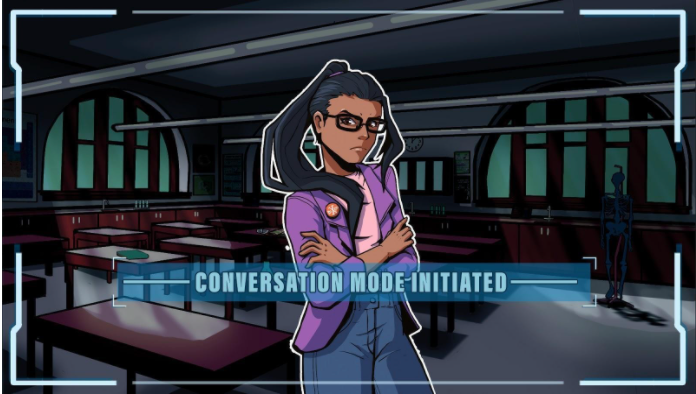
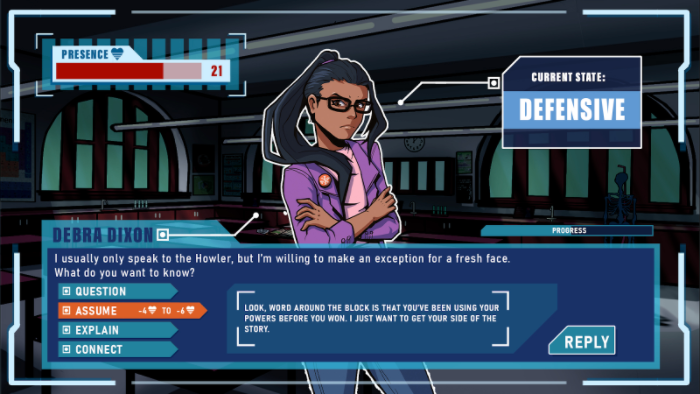
Research: This game takes place in the all too familiar landscape of a social media feed. Setting the game on social media allows for high transferability of skills, as this is where students would most likely encounter misinformation in their own lives. In our research game, students must flag posts as “accurate” or “misleading” by researching the post’s content in a simulated search engine. They’re also taught lateral reading techniques, along with learning about different misinformation types such as satire, false context, imposter content, and fact versus opinion.
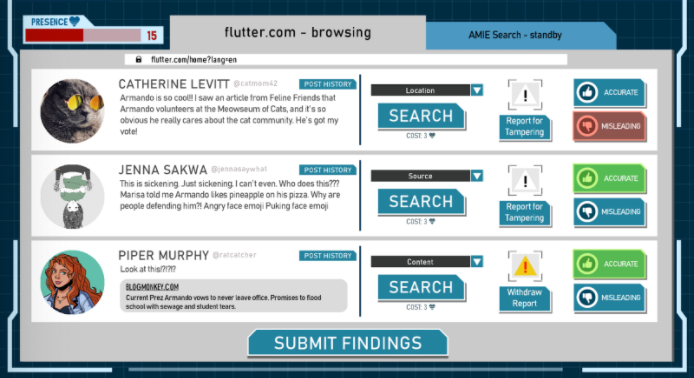
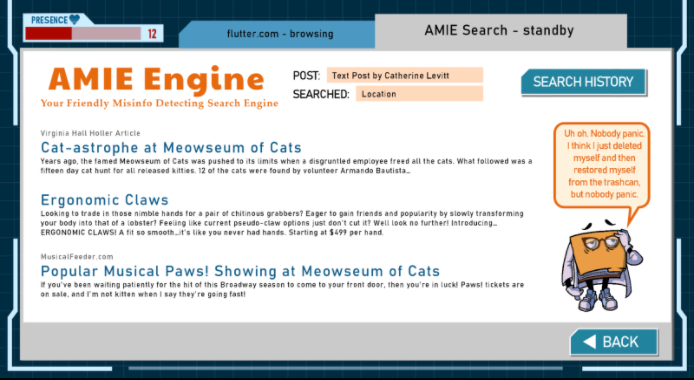
Analysis: Your artificial intelligence friend, A.M.I.E. is malfunctioning, and you have to prove to her that you’re a master of misinformation by answering her questions. Visually, we have a maze representation of A.M.I.E.’s circuitry, which students can navigate if they correctly answer analytical questions about an article they read. Students answer true and false questions about the purpose of the article, the bias of the author, logical and data fallacies the article employs, and many other relevant skills useful to critical reading.
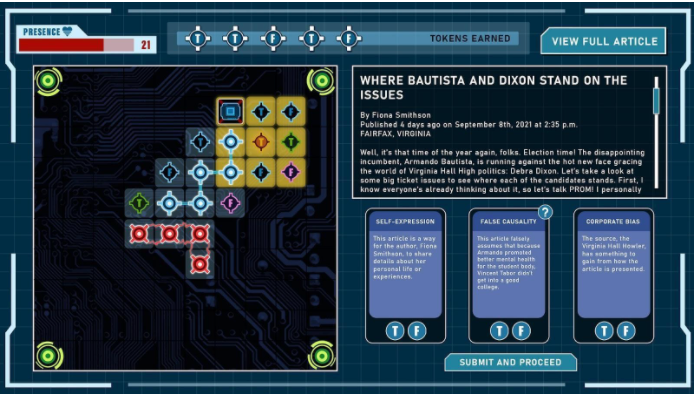
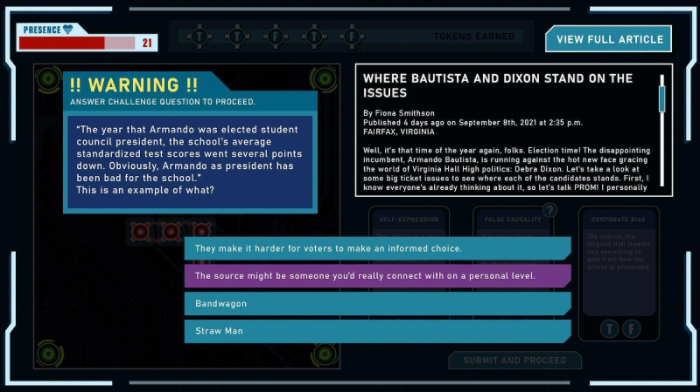
Finale: This last game is the emotional and intellectual climax of every module of Agents of Influence. Players must save a fellow student who has had their memories corrupted by misinformation. Through research and critical thinking, the player must remind their classmate who they truly are and save them from the clutches of misinformation.
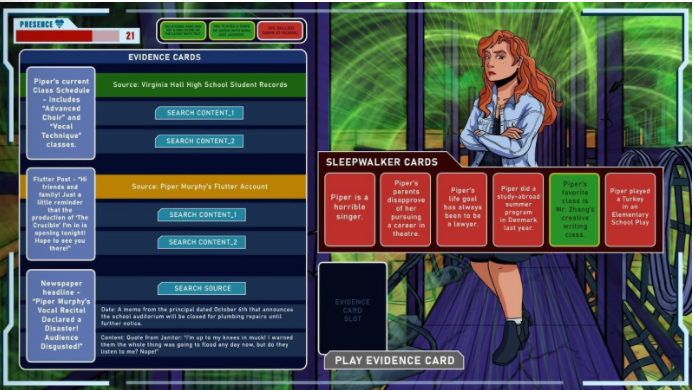
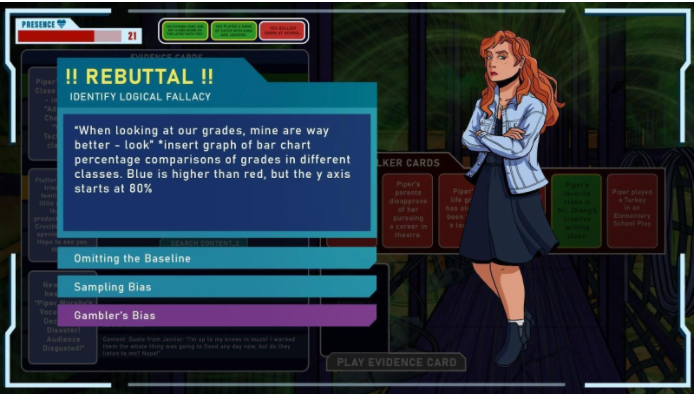
All of these games combined give extensive practice to help make critical thinking “top of mind,” which has a very positive impact on participants’ ability to recognize misinformation.

In addition to our games, Agents of Influence also has an immersive, narrative-driven story that allows for the learning objectives to last longer thanks to their emotional resonance with the player. Our game is set at Virginia Hall High, a fictional high school built on top of the headquarters of a Cold War-era spy base. Unfortunately, a nefarious organization known as Harbinger is trying to manipulate the school through misinformation, and they can only be stopped with your help. Luckily for Virginia Hall High, the player quickly forms the Agents of Influence to stop Harbinger. They team up with a senior, Taylor Jones, and throughout the course of the story, the player builds a team of agents that become like a family to them as they try to stop Harbinger’s plots, which are all themed around different misinformation topics.
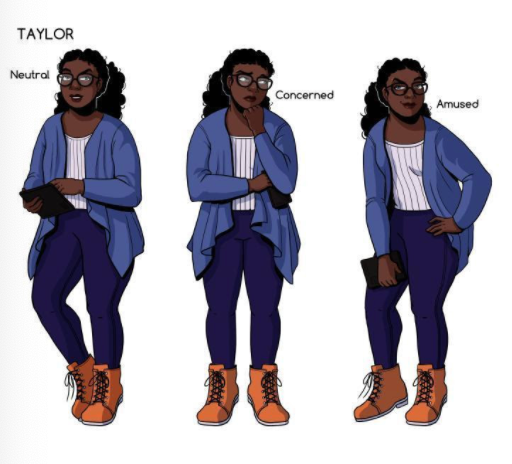
Structurally, we’ve separated our game into three modules, along with a tutorial and a finale. The three main modules are centered around cyber danger, political bias, and pseudoscience, and for ease of classroom integration, each module is broken down even further into roughly thirty-minute sections. Currently, we are focused on our first module, Agents of Influence: Cyber Danger, but in the future, we hope to create the full game if teachers find it useful in their classrooms and want more.
We’re also working on additional practice rooms outside of the narrative to drill skills more, and we also will package the game with Standards Education documents to more easily fit the game into a curriculum. In addition, the game comes with educational information for in-class lessons.
We believe that this game and others like it have a great capacity to teach students essential skills that will stick with them for the rest of their lives. Games can make students actively want to learn, which is a much more helpful motivation to long-term success than simply getting a good grade. Agents of Influence is the spark that will get students thinking critically about the information they consume online, which is an essential step to making a safer world. To learn more about this project, play our prototype, and help make this game a reality, visit our kickstarter or our website for more information.
About the Author
Michael Warker is a recent graduate of the University of Southern California where he studied Theatre and Screenwriting. He is writing on behalf of Alterea, Inc., which is a story-telling company focused on immersive story-living that lets participants grow and change through the stories they experience. This article was written in association with Anahita Dalmia and Jasper McEvoy. Visit our website here: https://www.altereainc.com/



